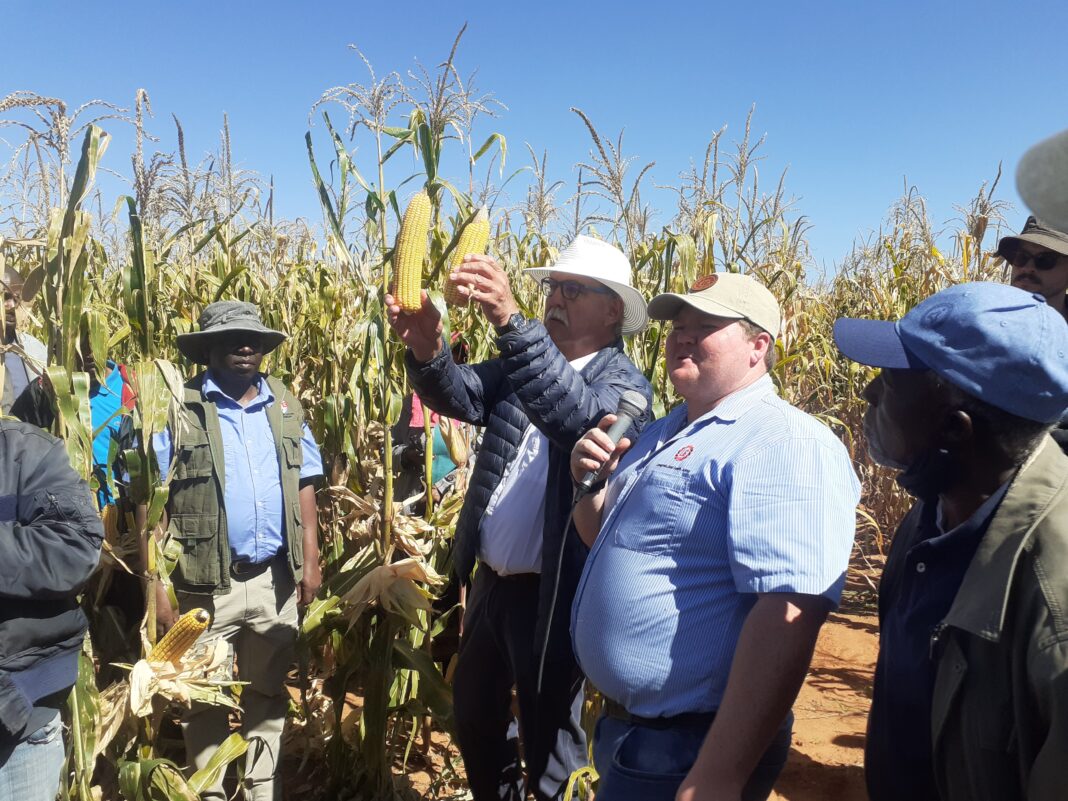…in a bid to elevate domestic cereal shortfalls
KABELO MASOABI
LERIBE – The introduction of improved hybrid seed varieties in the Leribe district has brought hope to local farmers who have been beset by depleting harvests over the years.
According to a prominent farmer, Mahala Molapo, who is a former minister of agriculture, the situation affects the availability of income-earning labour opportunities in agriculture as households prioritise food expenditures over agriculture inputs and labour.
“Local farmers are experiencing depletion of food from their production. Livelihoods continue to be strained in Lesotho mainly due to the poor agriculture which is below average harvest,†Molapo said.
“The characteristics of a good harvest include selecting the right seed variety to harvest the crop on the right date. This I have learnt from Limagrain Zaad, the company that assisted me throughout the summer cropping,†he explained.
In December last year, Molapo together with a South African joint venture company called Limagrain Zaad, engaged in a pilot project aimed to overturn the poor plantation of maize grain.
Molapo’s field at St. Monica’s was selected for seed testing.
During a recent visit to the field, the trial was hailed a success by both parties, including the Ministry of Agriculture, local farmers and other stakeholders.
“I invited Limagrain Zaad to test their seeds on the field and today I’m proud to announce that the plantation made a big change to my yield and I also invited local farmers to witness this development,†Molapo said during a visit to his field.
Limagrain Zaad South Africa is the blend of Link Seed (Group Limagrain); Klein Karoo (Zaad Holdings) and Seed Co – the largest seed company in Africa.
It is defined as a company providing a competitive multi-crop alternative for farmers in South Africa, Lesotho, Eswatini, and Namibia.
Its Director, Hans Taljaard, said the organisation was the only seed company to link breeders, farmers, industrialists, distributors, and consumers.
Taljaard said they provide farmers with innovative solutions based on plant genetics.
This, he added, helps agricultural production systems achieve better agronomic and environmental performance, thereby helping farmers meet societal expectations concerning food quality.
“Our assignment here in Lesotho is to create a concept that would persuade farmers that the results of the trials would run true within their own crops and that they wouldn’t end up with a season of wasted growth,†he said.
He added: “Our model enables farmers to choose the seed variety that will give them the best results for their respective situations and calculate the number of seed bags needed based on the field size to ensure there is limited or no wastage. We sell three top brands of seeds which are LG; K2 and Seed Co.â€
Taljaard also counted seven varieties of improved seeds that were planted on the tested field for the summer cropping and said all have produced a quality harvest.
He was also quick to note that the seeds were planted at different times depending on climate.
Minister of Agriculture, Food Security, and Nutrition, Thabo Mofosi, said: “As a country, we will go forward with happiness if you (Limagrain) can feed us and I think we will work hand in hand with you and with other local companies.â€
Mofosi said for a long time, Lesotho had been getting support from various non-governmental organisations (NGOs) but indicated that the biggest problem with local farmers was putting the information they received into action.
He suggested forums should be held regularly and include all stakeholders to help commercial farmers.
“We are going to commit our banks to offer loans to local farmers so they can purchase all the necessary equipment needed in the agriculture industry,†he said.
The minister, who is also a renowned farmer, also promised to increase crop production with the M567,394,199 budget allocated to his ministry by the parliament.
He said the allocation will allow him to increase the crop and fruit production in the country.
“The ministry will continue with seeds and fertilizer subsidies ranging between 70 to 80 per cent to meet the farmers halfway in a bid to increase food production and fight hunger,†Mofosi said.
He also said that his ministry’s officers will hold a range of trainings that will provide farmers with the necessary farming skills.
A local farmer, Moliko Khojane from Tsikoane, indicated that he was optimistic that the improved hybrid seeds would go a long way in changing the farming trajectory in the country.
“Working together makes it easy to achieve success than by working alone. As we head for winter cropping, we feel more empowered by the development we have witnessed here today,†Khojane said.




